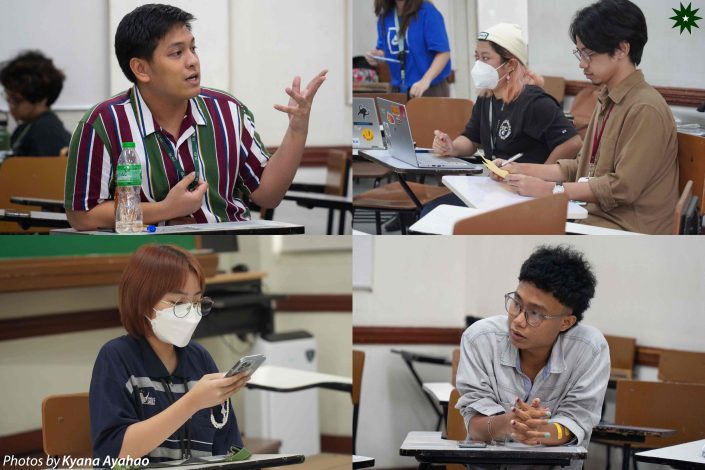Representatives from progressive youth groups voiced their perspectives and concerns on pressing national issues at the State of the Lasallian Address Forum (SOLA) last July 21 in Room 204 of St. La Salle Hall.
The forum took off with a discussion about the performance of President Ferdinand Marcos Jr.’s administration so far. Francis Mendoza, a representative from Anakbayan Vito Cruz, pointed out that the Marcos-Duterte administration falls short of serving the needs of the Filipino masses. He argued that “inuuna [ng pamahalaan] ‘yung facade o image ng administrasyon” amid pressing national concerns such as inflation, high unemployment rate, and farmers’ declining access to land.
(The government prioritizes its facade or image.)
DIWA Vito Cruz Chairperson Josh Baylon slammed government celebrations of the P40 daily minimum wage increase in the National Capital Region (NCR) implemented last July, saying it was “failing to consider the family living wage” in the area. Minimum wages for non-agricultural and agricultural workers in NCR are currently at P610 and P573, respectively.
The forum also tackled challenges faced by Lasallians. Both speakers discussed the University’s decision to impose a four-percent tuition fee increase and argued that the administration should have consulted and warned the students more about the increase.

Baylon furthered that education as a whole has become inaccessible and that the government is “prioritizing employability over accessibility.” He expounded that “imbes na maging nationalistic, mas nagiging focused [ang edukasyon natin sa] kung paano tayo ma-e-exploit sa ibang bansa through cheap labor.”
(Instead of being nationalistic, education has been more focused on how we can be exploited by other countries through cheap labor.)
Major issues regarding basic student services such as the University’s enlistment process, bureaucratic University processes, and outdated systems of My.LaSalle and Animo.sys were brought up by Mendoza. He also questioned DLSU’s implementation of a hybrid learning modality. “Kaya na sana natin makapag-full face-to-face [classes] upang makatulong rin ma-ensure ang dekalidad na edukasyon. Parang nakakalito para sa atin na bakit hanggang ngayon, tayo ay naka-hybrid pa rin na setup,” Mendoza said.
(We are capable of having full face-to-face classes to help ensure the quality of education. It is confusing why we are still in a hybrid setup until now.)
In a help desk announcement during the start of Academic Year 2022-2023, the Office of the Provost noted that classes were scheduled rotationally to cater to the high influx of Lasallians during the pandemic. A previous article by The LaSallian also reported that the University no longer plans to implement full face-to-face classes.
Regarding the cancellation of the DLSU General Elections, Mendoza pushed that student democratic rights be upheld. “Malabo ang genuine student representation kung ang tao na uupo ay hindi binoto ng student body mismo.”
(Genuine student demonstration cannot be achieved if the person seated in position was not voted by their own student body.)
Mendoza also spoke on the possible reimplementation of mandatory Reserve Officers’ Training Corps (ROTC), arguing that this violates the right of students to choose how they would like to express their nationalism. He emphasized that “nationalism is not [limited] sa military training, ROTC” and that mandating students to undergo ROTC “is a clear manifestation of militarization.”
According to Baylon and Mendoza, these issues highlight the role of Lasallians in engaging with the masses and pursuing beneficial societal change. “Dapat lumulubog tayo sa masa. Kailangan natin lumabas sa sarili nating bubble,” Baylon urged.
(We should be immersing ourselves with the masses. We need to get out of our own bubbles.)
Mendoza then emphasized the need to protect each other’s freedom and rights when challenging the status quo. “Sa panahon ng uncertainty, dapat mas lalo natin paigtingin ang paglaban para sa karapatan ng bawat isa. Kung ngayon nga na may oposisyon at ganyan na ang pamamalakad ng gobyerno ngayon, paano pa kung walang nagsalita?”
(In times of uncertainty, we must strengthen the fight for each other’s rights. If this is how the government runs even with an open opposition, what more if no one speaks up?)
